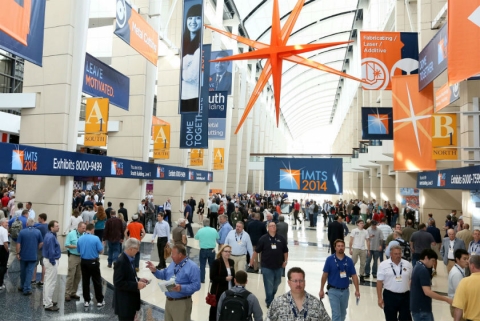Deutsche Messe’s Five Shows Collocated at IMTS Will Occupy Two Times More Space

Deutsche Messe’s five industrial trade show collocated at the International Manufacturing Technology Show (IMTS), on tap Sept. 12-17 at McCormick Place in Chicago, will occupy two times more space, compared with 2014.
IMTS currently is up 10 percent in display area space and 16 percent in exhibitor participation. Hannover Fairs USA, Deutsche Messe’s U.S. subsidiary, is organizing the five shows and conferences.
The growth of Deutsche Messe’s portfolio at IMTS is a direct result of the resurgence of manufacturing in America.
Industrial Automation NORTH AMERICA premiered in 2012. MDA NORTH AMERICA followed in 2014. Now ComVac NORTH AMERICA, Industrial Supply NORTH AMERICA, and Surface Technology NORTH AMERICA debut in 2016.
Together, the events account for double the display area in 2014 and represent five industry sectors: industrial automation; power transmission, fluid technology and motion control; compressed air and vacuum technology; industrial subcontracting and lightweight design; and surface treatment.
Compared with the same point in time in 2014, four times more space is sold for 2016, with 75 percent of registrations from companies based outside the United States.
“IMTS and our fairs collectively represent the largest industrial technology event in North America. For six days exhibitors have direct access to the world’s largest economy – one that is undergoing a manufacturing resurgence,” said Wolfgang Pech, senior vice president at Deutsche Messe.
He added, “Visitors experience first-hand the technologies and techniques that U.S. manufacturers use to stay competitive while at the same time learning about and comparing the Asian and European approaches to Industry 4.0 and the Industrial Internet of Things.”
Surveys conducted in 2014 at IMTS, Industrial Automation NORTH AMERICA and MDA NORTH AMERICA indicated that 86 percent of visitors found solutions to specific manufacturing problems, 85 percent planned to make a purchase within one year, and 64 percent initiated new business contacts.
Key trends at Deutsche Messe’s 2016 Chicago events include the “SMAC stack” (social, mobile, analytics, and cloud), which helps companies accelerate development and retain customers; the Industrial Internet of Things, which helps automate production and maintenance, freeing up more time for research and development; and next-shoring (developing and manufacturing products closer to where they will be sold), which improves production control and efficiency.
China, France, Italy, Germany and Taiwan are contributing country pavilions and the National Fluid Power Organization (NFPA) organizes the Fluid Power Area at MDA North America. Exhibiting companies include Beckhoff, B&R, Hawe, igus, Mitsubishi, Rockwell Automation, THK, Turck, and Wittenstein.
Three conferences round out the program at Deutsche Messe’s events. On Sept. 13, GIE Media runs three tracks – MDA plus ComVac, Industrial Supply and Surface Technology – for design, manufacturing and process engineers as well as plant managers and purchasing managers.
On Sept. 14, CFE Media stages the Global Automation & Manufacturing Summit and NFPA organizes a fluid power track.
Industrial Automation NORTH AMERICA, MDA NORTH AMERICA, ComVac NORTH AMERICA, Industrial Supply NORTH AMERICA, and Surface Technology NORTH AMERICA are organized by Deutsche Messe’s U.S. subsidiary, Hannover Fairs USA, Inc., in cooperation with AMT – The Association for Manufacturing Technology.
The five events run parallel to IMTS 2016 and belong to Deutsche Messe’s HANNOVER MESSE Worldwide portfolio.


Add new comment